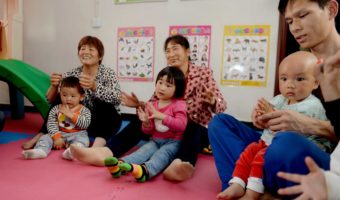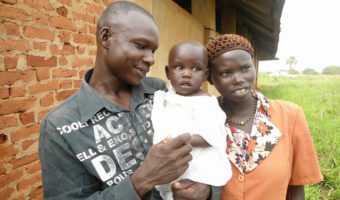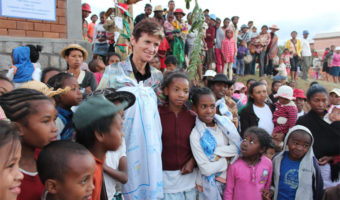It started with a simple yet revolutionary idea: use television to help less- advantaged children learn, so they could begin school as well prepared as their more-advantaged peers. Fifty years later, Sesame Street reaches children in 150 countries with lessons not only about letters and numbers, but about important socio-emotional skills they need to thrive. Sesame Workshop has become the world’s largest informal educator.
Since Sesame Street’s creation in 1969, our theory of change has remained the same: if access to education determines futures, then media delivering educational content to broad audiences can spread life-changing opportunity. And while Sesame Street was designed for children in the USA, soon countries like Brazil, Germany and Mexico wanted this groundbreaking mix of learning and fun for their children. Because of the characters’ universal appeal, the Sesame Street Muppets had a unique ability to cross borders, and Sesame Street’s creators learned that their model could scale to reach children in some of the most under-resourced regions of the world, many of whom had no other means of quality early education.
Today, in countries like Afghanistan, Bangladesh, and India, we produce completely localised versions of Sesame Street, working with partners on the ground to create adaptations tailored to the local language and culture, with characters and storylines that children can relate to. International co-productions share the Sesame Street model and core educational goals, but the specific curriculum for each country is tailored to the unique needs of children there.
No matter the environment, media and Muppets have proven to be a powerful means to provide high-quality early learning at scale. Over a thousand studies can attest to Sesame’s impact. A 15-country meta-analysis on the effects of watching Sesame Street, spanning from South Africa to Bangladesh, found an effect size of 0.29 across learning outcomes, comparable to those of early childhood interventions in developing countries (Mares and Pan, 2013). Multiple evaluations confirm the effectiveness of localised Sesame Street content in a variety of learning outcomes, including health, literacy, maths, and prosocial behaviour.
Mass media is inherently scalable, but we have identified three necessary components for reach and impact: research, distribution and partners. First, everything we do is grounded in research and tested along the way. Second, we must reach to teach – which means using creative distribution methods to reach children wherever they are. Lastly, to serve the most vulnerable populations, finding the right partners is key.
Our methodology: the Sesame Process
Sesame Workshop has always focused on a child’s earliest years, when we can have the greatest impact. We create our content – tackling even the most difficult issues – from a child’s perspective. And everything we do is guided by a rigorous, research-driven process. As co-founder Joan Ganz Cooney has often said, ‘Without research, there would be no Sesame Street.’
We use research to tailor content to children’s needs. Each project starts with careful analysis: what specific challenges face the children we hope to reach? Where and how can Sesame uniquely play a role? Next, we meet with local experts including educators and early childhood development specialists to advise us in developing a bespoke and culturally resonant curriculum with measurable learning objectives. Formative research then informs content production, guiding the writers, artists and performers who bring every Sesame programme to life. Once a programme or initiative is launched, we conduct summative research and impact evaluations to learn what works and what doesn’t. We continuously iterate to improve, and view every season of Sesame Street as a new experiment – a constant loop of measuring, learning and iterating.
This process is underway with our programme to provide early education to children affected by the Syrian refugee crisis, in partnership with the International Rescue Committee (IRC) – a programme first piloted with support from the Bernard van Leer Foundation and Open Society Foundations. In 2017, the MacArthur Foundation awarded Sesame Workshop and the IRC a landmark grant of USD 100 million to scale our programme and create the largest early childhood intervention in the history of humanitarian response. Through the power of mass media, with a new Arabic language version of Sesame Street, Ahlan Simsim, as well as through direct, in-person services for the most vulnerable children, we will reach millions of children and families in Iraq, Jordan, Lebanon and Syria with quality early learning.
‘Sesame Street reaches children in 150 countries with lessons not only about letters and numbers, but about the socio-emotional skills they need to thrive.’
Building on the research conducted for our pilot in Jordan, we began with an assessment of the needs of displaced and host-community families in our target countries and consulted with local experts to lay a foundation for our curriculum-driven, culturally relevant programming. Research informed the adaptation of Sesame materials like storybooks, posters and video clips, all being integrated into the IRC’s preschool classrooms, health centres, home visiting programmes, and more. Ahead of the autumn 2019 launch of our new Sesame television programme, Ahlan Simsim, extensive research, testing, and work with advisors informs everything from our educational framework to the design of our new Muppet characters.
Our programme is designed to serve as a scalable model. We enlisted New York University’s Global TIES for Children as our independent evaluator, conducting a multi-year, evidence-based research and evaluation programme to measure the success of our approach. Given the dearth of early education research in crisis settings, summative research is a critical deliverable of our programme – the university’s five planned rigorous evaluations will double the existing evidence base on what early education programmes are most effective in crisis settings, enabling others to learn from our work.
Last year, the LEGO Foundation was first to step up and meet the MacArthur Foundation’s call for the bold philanthropy needed to transform the way the humanitarian system serves children affected by crisis. They provided a grant of USD 100 million to support children affected by the Rohingya and Syrian refugee crises with play-based learning. In partnership with the IRC in the Syrian response region and BRAC in Bangladesh, we will develop, test, and refine learning through play programming models for young children affected by displacement, enabling this work to be scaled and replicated in other contexts.
You must reach to teach
When it comes to content delivery, our commitment to meeting children where they are requires flexibility; no two distribution models are exactly the same. Sesame Street was launched using the cutting-edge technology of the time, television – and while today we use every media platform, from television to digital to mobile, sometimes the best way to reach the children who need us most requires a lower-tech approach. Whether it’s battery-operated projectors in classrooms in refugee settlements, or a repurposed vegetable cart equipped with a television and a DVD player in slums in India, we’re continually assessing the most effective platforms to reach our target audience.
‘Each project starts with careful analysis: what specific challenges face the children we hope to reach?’
In Afghanistan, Baghch-e-Simsim, the local version of Sesame Street, finds its way to children through television, radio, YouTube, and even a free mobile service that enables families to simply dial 1234 on their phones to listen to episodes. Community viewings bring together hundreds of children, caregivers and teachers to watch episodes and participate in corresponding activities to reinforce educational messages. By 2017, over 3.1 million children age 3–7 were tuning in. And Baghch-e-Simsim isn’t only engaging children: more than 70% of our audience watches with a parent or caregiver, further deepening learning outcomes.
Finding the right partners
We can’t reach vulnerable children at scale single-handedly, so we seek partners who share our values, complement our strengths, and contribute different skills, ensuring a greater combined impact. From our work with the IRC and BRAC to organisations like World Vision, we partner with direct service providers to integrate Sesame content into their day-to-day work, empowering them with high-quality resources and enhancing their services. In thus leveraging our proven educational content – both newly created and evergreen materials produced over decades – we deepen our partners’ reach and broaden our own.
In the USA, through our Sesame Street in Communities programme, we partner with both national organisations like Head Start and local social service providers to bring research-based Sesame resources covering everything from the academic basics to physical, social and emotional health straight to the caring adults in children’s lives. We also provide free training and professional development resources to address children’s developmental, physical, and emotional needs and give them the tools they need to help children and families overcome specific challenges.
Using the power of our engaging Muppets, our resources are designed to build coping skills and foster nurturing connections between children and caring adults, whether they’re parents, teachers, or social workers. That’s where Sesame’s deliberate appeal to adults gives us an advantage. Sesame Street’s creators always believed that the learning would be deeper if an adult were watching with a child, which is why we’ve always featured humour, celebrities and parodies appealing to adults. Our content becomes both a tool for a parent or provider, and a catalyst for engagement between adult and child, further deepening our impact through the help of partners on the ground.
Conclusion
‘Our commitment to meeting children where they are requires flexibility; no two distribution models are exactly the same.’
Sesame Street’s founders once asked if television could be used to give less- advantaged children the educational foundation they needed to arrive at school ready to learn. Fifty years later, we’ve proven media’s ability to deliver high-quality early learning at scale worldwide. Media remains the most cost- effective means to scale early childhood education and, moreover, it proves to be a powerful catalyst for the all-important adult–child engagement that carries learning off-screen. As caregivers interact with children around Sesame content, their ongoing engagement meaningfully extends our educational impact.
So, with an enduring commitment to our mission to help children everywhere grow smarter, stronger, and kinder; to our proven method; and to strong partnerships, we will be using media to bring critical early education on a mass scale to children around the world for the next fifty years and beyond.
References can be found in the PDF version of the article.



